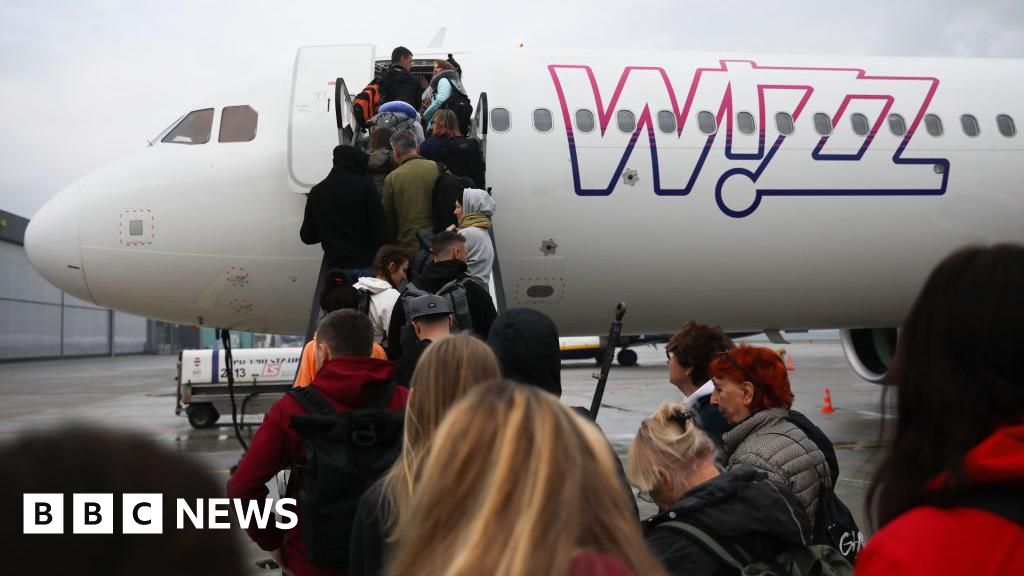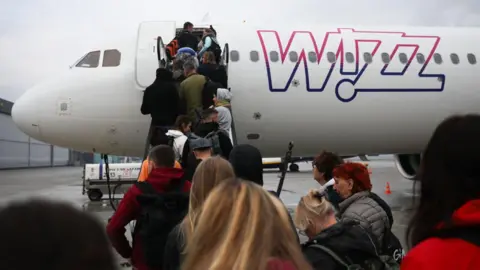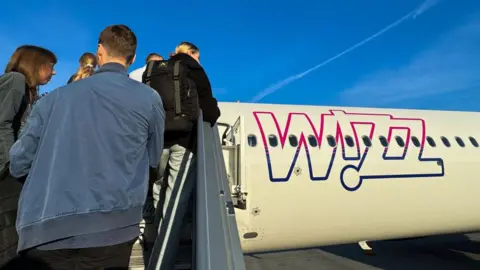Travel
Wizz Air: Is ‘all you can fly’ subscription too good to be true?

 Getty Images
Getty Images“All you can fly” – unlimited flights for an annual subscription fee. What’s not to like? A fair amount, for some passengers, it turns out.
Wizz Air’s new scheme under that title has divided opinion. Some have praised the €499 (£426) scheme’s “insanely great” value on trips as far as the Maldives, and the budget airline says it has been “overwhelmed” by the positive response.
But others hit out at the airline’s service and recalled their own experience of delays, while questioning the scheme’s terms and conditions.
Wizz says its new membership, effective from September, will allow frequent flyers to “save money, visit friends and family more regularly and spontaneously visit off-the-beaten-track destinations”.
It says it sold out in most markets within 24 hours, but some customers have been pointing out what they describe as a “catch”. Those who sign up can only book flights up to three days before departure and must pay a fee of about €10 per flight.
Flights do not include “trolley bags” to stow in overhead compartments or checked baggage. And crucially, the scheme is limited to just 10,000 people. It’s also dependent on whether there are any seats left.
Wizz, which flies to 53 countries, carried 62 million passengers in the year to the end of March.
Its scheme is similar to those being offered by Frontier Airlines in the US and Malaysia-based AirAsia.
Is it a good deal?
 Getty Images
Getty ImagesRory Boland, editor of Which? Travel, advises passengers to look behind the enticing headline price to work out if this really is a good deal for them.
Once booking fees, seat selection and luggage costs are added on, travellers will see costs climb, he says – particularly as multiple short-notice journeys will be required to break even on the original cost of the subscription.
“It is also ironic to see an airline which claims to be Europe’s ‘greenest’ encouraging consumers to take unlimited flights,” he adds.
The Hungarian airline has faced a number of hurdles in the last year, which it might be hoping to overcome with the new scheme.
In June, the airline was named the worst for UK flight delays for the third year in a row, based on analysis of official data by the PA news agency.
And in January, it had to pay an extra £1.2m to customers in compensation, after the industry regulator intervened over the way it had handled flight disruption.
Wizz Air points out that it has been working on improvements, such as investing an extra £90m in its operations and customer service last year. And it says 1.8% of its UK flights were delayed for more than three hours in the first half of this year – a 50% reduction on last year.
Talie Delemere, 34, is excited about the scheme and has already signed up. She lives near Luton airport and likes being able to travel whenever she likes.
“I travel a lot anyway, between eight and 12 times a year and I mostly travel with hand luggage,” she tells the BBC.
“Wizz Air are a mixed bag but I don’t find them any better or worse service-wise than any other low cost carriers and their aircraft are far nicer and more comfortable than Ryanair’s.”
But others are not convinced.
“You can subscribe to this scheme but you might never take off,” says James Glenton, 36, from York, who is still hoping for compensation for a cancelled Wizz Air flight a year on.
In July 2023, Wizz cancelled Mr Glenton’s flight from Leeds Bradford Airport to Wroclaw in Poland and rebooked him on one from London Luton the next day, he says.
That meant he lost two days of his holiday, the parking he’d booked at Leeds Bradford, money spent on his hotel, and the petrol costs getting to Luton and back, he says.
According to Mr Glenton, Wizz has blamed air traffic control restrictions for the cancellation so won’t refund him. But he claims the airport denies this and has told him it was the airline that cancelled the flight directly.
“I am not hopeful about a refund, I won’t get anything from them,” he says. “I am angry, I would never fly with Wizz Air again.”
Mark Shatliff, 39, from Reading, also says he won’t be signing up to the scheme.
His Wizz Air flight from Istanbul to London was delayed by six hours last July and was so late when he landed that he had to pay an additional £120 for a taxi home, he says.
 Mark Shatliff
Mark ShatliffWizz initially refused to refund him but relented when he took the matter to a dispute resolution company.
“I think people who subscribe to this scheme won’t get the value out of it,” he tells the BBC.
“What you end up paying if things go wrong is so much more – it isn’t worth it.”
While Wizz said it could not comment on individual cases, it offered to look into James’ and Mark’s reports.
‘Still a perfectly reasonable choice’
Travel expert Simon Calder thinks the scheme could be a good deal for some fliers but not others.
He believes the subscription offer is aimed at travellers such as Eastern Europeans in the UK who go home regularly to see family. Wizz already offers other discount schemes for travellers, he adds.
“People will do their sums and I’ve done mine, it won’t really work for me,” he tells the BBC.
Some have raised concerns that the scheme could encourage frivolous flying that harms the environment, but Mr Calder thinks the impact will be minimal. He also thinks criticism of the airline’s performance is overblown.
Mr Calder says: “I fly on lots of airlines, if I want to be on time I generally go with Ryanair. In general I find Wizz and EasyJet pretty much the same.
While he says that Wizz’s recovery “when things go wrong has historically not been great”, they are still a “perfectly reasonable choice” for the thousands of passengers who may opt for its “all you can fly” option.











